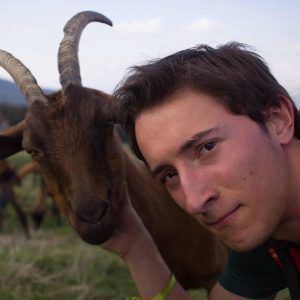Researcher Profile: Adrien Kroese, Former International Research Student
MSc Organic Agriculture at Wageningen University & ISARA-Lyon

Adrien Kroese posing with an Alpine Goat
What is your research project, and what is it all about?
My research is about measuring sustainability. What is a sustainable farm? What are sustainable practices? Is what we picture as a sustainable farm actually sustainable?
What has that project looked like up until this point?
We define the sustainability of a system by its contribution to environmental preservation, economic welfare and social justice, and by its ability to continue to function in time, absorb shocks, and adapt to a changing environment. The project looks like a list of indicators that describe the properties of sustainable farming systems: self-reliance, social equity, the use of natural inputs, the non-use of very energy-intensive inputs, and pollution.
How are you measuring these distinct facets of sustainability?
Some of the long-term aspects of sustainability come down to key economic accounting variables: whether you’re making a profit in the long run, whether you will not have to pay too much debt back in the coming years, whether you can still make a profit in the long run. Long-term sustainability also comes down to environmental and social indicators: do you have a resource base that is being preserved? Do you manage your soil in a way that keeps it productive in the long run? Is labour available? Is your farm attractive as a work-place? We’re trying to identify all the variables that constrain or enhance the functioning of the farm in the long term. Our measure of sustainability also includes externalities (such as pollution) that might not affect the farm directly, but will affect the region.
What is the relationship between sustainability and the Certified Organic designation?
We tend to have the assumption that organic is sustainable. It is, in many cases. When you go out to a genuinely sustainable farm, you know it immediately, because you see the biodiversity. However, there are also big Certified Organic mono-crops that are very similar to their non-organic pairs. My research aims to discover what sustainable agriculture is, once you transcend the impression that organic always equates to sustainable.
What surprises you about this work, either in terms of process or results?
There’s consensus on the concept of sustainability, but also discord. There’s consensus on the fact that sustainability encompasses social, economic, and environmental preservation, that sustainability is urgent, and that sustainability denotes the ability to function in the long term. How the concept of sustainability translates into practice, however, is very unclear. Take, for example, a small-scale farm: there’s enough calories produced on that farm to feed everyone who works it and more, but many fewer calories produced than on a large-scale conventional wheat operation. Is that actually sustainable? Will we be able (at least in the current regime) to feed people with small-scale diversified farms? Because to do so will require a lot more labour in agriculture, which is not the model that we have been following. Despite the fact that there’s tradeoffs, however, I do believe that diversified agroecosystems are much more resilient in the face of change.
What’s next for the project?
The next step of this project is seeing where we have trade-offs and synergies between different facets of sustainability. One example of such a trade-off is the fact that you can easily make a profit by depleting your resource base: you can have very high income but then a very low score in environmental sustainability. Right now we’re setting up indicators on different farms to collect data, which we hope to use to quantify some of these trade-offs.
How did you get into this work in the first place?
Pure personal interest. I like agronomy, and I like seeing how elements connect together to make a system work. On the West Coast, there’s a lot of research being done on sustainable agriculture, so I went to see if they have a project about that here, and they had! The Diversified Agroecosystems Research Cluster wanted to answer the question; “are diversified agroecosystems more sustainable than conventional farming systems?” My research (quantifying the sustainability of respective agricultural systems) is one piece amongst other projects that are attempting to answer that research question.
How does the CSFS fit into your work?
I work for the Centre for Sustainable Food Systems at the UBC Farm and the Diversified Agroecosystems Research Cluster. I use data from the UBC Farm for my case study.
What should people know about the CSFS that they probably don’t know?
We might be criticized for not connecting enough with the agricultural reality. What I would like people to know – especially professionals in the agricultural sector – is that we really want to reach out to farmers, to work with them, to work for them, to come up with the tools that they need to work towards more sustainable farming systems.
What’s your favourite thing to do at the UBC Farm?
Walking around. Because it’s gorgeous and pretty effortless.